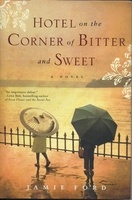As public programs manager at the Japanese American National Museum, I receive a lot of books about the Japanese American experience. But my favorite book that I have received so far was Jamie Ford’s debut novel, Hotel on the Corner of Bitter and Sweet.
The book is about a budding relationship between a Japanese American girl and a Chinese American boy in Seattle that spans from the tumultuous times of World War II to present day.
As of this writing, the book is #22 on the New York Times Best Sellers list for paperback trade fiction. As Asian Americans, we often bemoan the fact that our stories and writers are regulated to the niche bookshelves. But Ford’s success is a testament that a good story and writing can break out and do well in the mainstream marketplace as well.
We were lucky and honored to have Ford at the museum for a public program at the Tateuchi Democracy Forum on January 29, 2011. He entertained a crowd of museum visitors with stories about the book and his life.
Because he was so engaging and funny, we wanted to ask him some more questions…
What got you interested in Japanese Americans in World War II?
Well, the novel actually began as a short story—and that story was about a Chinese American boy during WWII, who was given an “I Am Chinese” button to wear to school. It dealt with racial and family identity. But sometimes the characters we create animate on the stage and do rather unexpected things, and in this case, my character of Henry befriended a Japanese American girl, and wanted to give his button to her, to protect her from bullying and the contempt of the white kids at school. Once that emotional transaction took place, it opened a door, point-of-view, observing the Japanese Internment, and Japanese Americans, through Chinese eyes—and the story grew to novel length.
How have audiences responded to the book? Have the Japanese American community responded differently than the non-JAs?
So far the book has been (or is in the process of being) translated into 29 languages—so the response has been tremendous. It was even the #1 book in Norway for months and months, which astounds me, because you never sit down to write a book and think, “Oh yeah, this is gonna be HUGE in Norway!” But along with that I’ve had a tremendously positive response from the Japanese American community, which is satisfying. If I had written a story set in France in the 14th Century, there would be no one living to praise or damn the book, but there are thousands of people with direct, first-hand experience with the Internment. Their words of praise and appreciation are golden to me.
Tell us the hardest part in writing your book.
The hardest part, but also often the most enjoyable part, is the research. I love research, but you end up juggling a lot of details—places, people, events, and occasionally those details and accounts will conflict with one another. My job as a writer is to look at the directionality of those accounts and find the intrinsic truth that they’re pointing to.
Tell us your travails in trying to get the book made into a Hollywood movie.
Oh man, selling the film rights is like selling your baby to the circus. It’s like finding an adoptive family for your child. We had offers from people with the best of intentions, but little knowledge of how to get a movie produced, and huge studios with all the knowhow in the world, but with the worst of intentions. One producer’s vision of HOTEL: THE MOVIE, didn’t include Henry, my main character. It was going to be Keiko’s story and she’d fall in love with a No-No boy—which is an interesting story, but it’s not my book.
In the end we went with a group that is the right mix of experience and integrity, a great producer/director team. I have lingering doubts that the movie will ever find adequate financing, because I don’t have a starring role for Tom Cruise or Brad Pitt, but if it ever does go into production, it’ll be in good hands.
What is your next book about?
The new book is about a Japanese student in Seattle that gets repatriated after the bombing of Pearl Harbor and conscripted into the Tokkotai—the Thunder God Corps, suicide pilots known in the west as kamikazes. The Tokkotai were comprised primarily of university students, few were academy graduates. Along the way he falls in love with a Taiwanese girl, which complicates things. In the West we think of Imperial Japanese Army visiting hardships upon their neighbors, which they certainly did, but they also did terrible things to their own citizenry, and this book explores that. It’s another historical, multi-cultural love story, set in Seattle and Japan. The working title is “Whispers of a Thunder God.”
What advice do you have for young Japanese American writers?
Write the stories that are in you. Write the stories that haunt your imagination. And don’t be afraid to embrace a unique cultural perspective, or to explore others—regardless of genre. Octavia Butler, who wrote science fiction, once said, “There are no black people in the future, therefore the future is a dangerous place.” Writers of today can change that.
***
The book is available from the Japanese American National Museum Store.
© 2011 Japanese American National Museum






